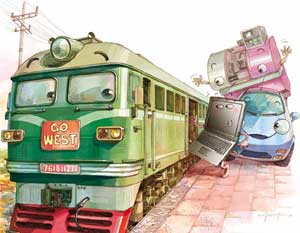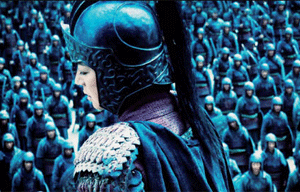It takes two to tango
Updated: 2011-10-28 09:26
By Wang Chao (China Daily)
|
|||||||||

Huge potential of co-productions attracts global filmmakers to China
For several years, despite its rich promise, China never figured prominently on the agenda of global filmmakers and distributors as the path to success was riddled with obstacles like strict regulations, piracy and a not too receptive audience.
|
||||
Not only has China become a market that commands the attention of buyers and sellers, but also an integral market in box-office returns for global film companies.
Industry sources say that China could surpass Japan and India in box-office receipts next year to take the second position globally and pose a strong threat to market leader US by the end of the decade. Lending credence to these claims are industry growth rates in excess of 64 percent and collections of over $1.5 billion (1.1 billion euros). Rough estimates for 2011 indicate that the industry could end up with receipts of over $2 billion.
During the past five years, domestic box-office revenue has grown by nearly 400 percent to 10 billion yuan ($1.57 billion, 1.13 billion euros) in 2010.
By current estimates there are more than 6,000 movie screens in China and another 20,000 will be added in the next 20 years. With such huge growth potential in the offing, there is no doubt that every filmmaker worth his salt wants a slice of the China pie.
Yu Dong, president of Polybona, one of the biggest film distributors in China, feels that box-office receipts could grow by another 15 billion yuan, as there are still more than 2,000 counties with no cinemas.
Teaming up
When Italian director Bernardo Bertolucci made his Academy Award winning film The Last Emperor on the life of the last imperial Chinese ruler Aisin-Gioro Pu Yi in 1987, he became the first foreign director to co-produce a film with Chinese partners.
However, the Chinese participation in the movie remained limited to some Chinese actors and actresses, without any real involvement in the story or other technical aspects.
While the film brought several accolades to Bertolucci, for China it was the first taste of Western filmmaking and filmmakers. Though The Last Emperor was screened in China in 1988, it did not make much in terms of box-office receipts.
While Bertolucci made the initial sorties, in 2011 the Chinese film industry has now become the calling card for big-ticket co-productions.
Wendi Deng Murdoch, the wife of newspaper baron Rupert Murdoch who owns the global film house 20th Century Fox, teamed up with a group of Chinese investors to produce the 2011 movie Snow Flower and the Secret Fan.
Since 2009, the number of co-productions with China has risen to 60 on average every year, a year-on-year growth rate in excess of 10 percent. In 2011, the growth rate is expected to surpass 30 percent, according to China Film Coproduction Corp (CFCC), which is responsible for co-production filings.
Co-produced films such as The Karate Kid released last year have brought big bucks to its investors. The film, co-produced by Columbia Pictures and China Film Group Corporation, cost $40 million to make and has so far earned $359 million worldwide.
"Making films in Hollywood is becoming more and more difficult as US film studios are getting increasingly worried over failures," says Dany Wolf, executive producer of The Karate Kid.
"The cost of making films in Hollywood is far higher than in China and the marketing costs for some moves can outstrip even the production budget.
"China's long history and rich literature is full of amazing stories that would make wonderful films. I am reading books and screenplays and constantly looking for new films ideas," he says.
Thrilled by the success of The Karate Kid, Wolf says he is planning other co-production ventures in China to create exciting films that will appeal to Chinese, US and global audiences.
"The future of Chinese cinema is very bright and co-productions are the key to making that light shine around the world," Wolf says.















